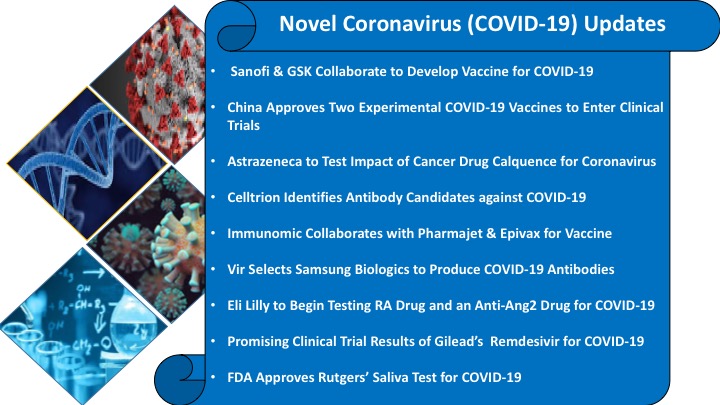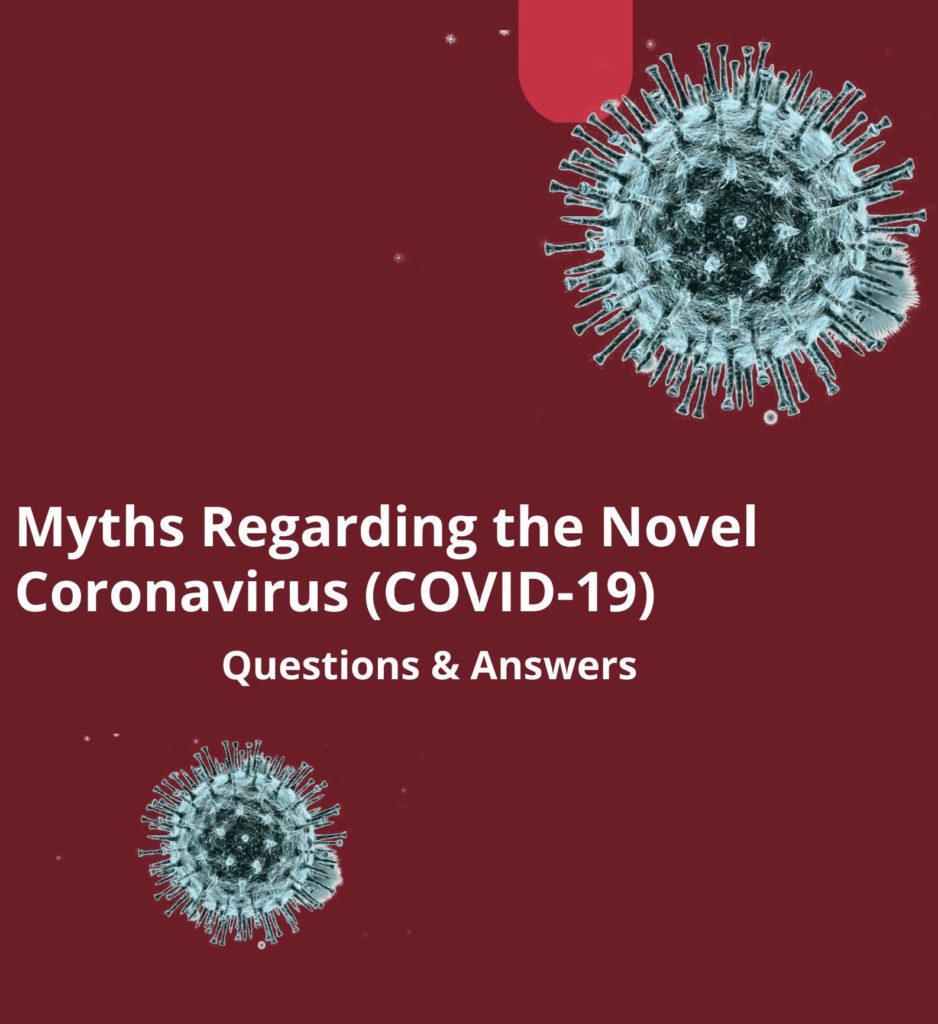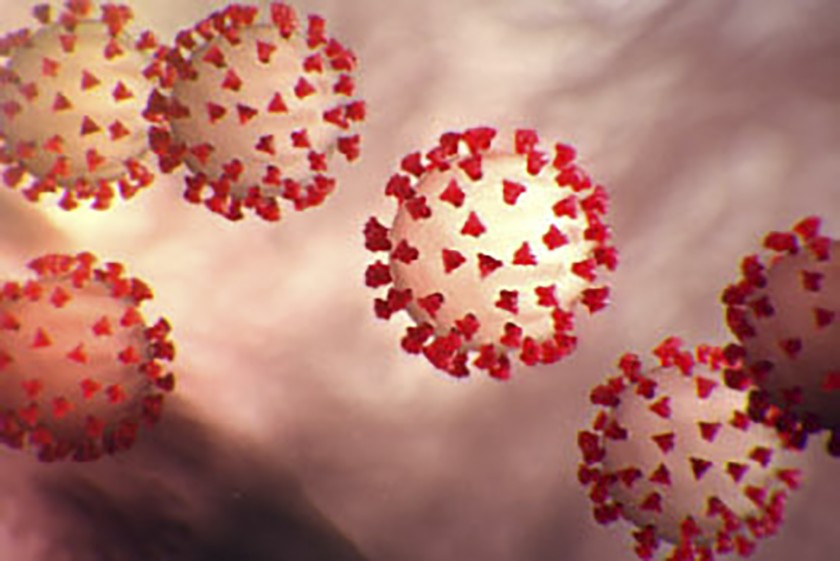Novel Coronavirus: Recent Updates
Sanofi and GSK Collaborate to Develop Vaccine for COVID-19
Sanofi and GlaxoSmithKline have signed a letter of intent to develop an adjuvanted vaccine for COVID-19, using innovative technology. Sanofi would contribute its S-protein COVID-19 antigen, which is based on recombinant DNA technology whereas the GSK would contribute its pandemic adjuvant technology. The use of an adjuvant technology would help in reducing the amount of vaccine protein required per dose, allowing more vaccine doses to be produced and therefore help in protecting the more people.
China Approves Two Experimental Coronavirus Vaccines to enter Clinical Trials
China has approved early-stage human tests for two experimental vaccines to combat the new coronavirus. One vaccine is being developed by a Beijing-based unit of Nasdaq-listed Sinovac Biotech, and another vaccine is being developed by the Wuhan Institute of Biological Products.
AstraZeneca to Test the Impact of Cancer Drug Calquence on Coronavirus Patients
AstraZeneca is planning to start a clinical trial of its cancer drug i.e. Calquence to assess its potential to control the exaggerated immune system response associated with COVID-19 infection in severely ill patients.
Calquence (acalabrutinib) belongs to a class of drugs called Bruton’s tyrosine kinase (BTK) inhibitors which can suppress autoimmune diseases. Calquence is currently used to treat certain types of blood cancers, has already been approved for the treatment of adult patients with chronic lymphocytic leukaemia in the United States and several other countries.
Celltrion Identifies Antibody Candidates against COVID-19
Celltrion has successfully selected the most potent antibody candidates to neutralise SARS-CoV-2, the virus causing COVID-19. Celltrion will begin cell-line development mass production of the selected therapeutic monoclonal antibody. The Company would conduct the efficacy and toxicity testing with Korea Centers for Disease Control and Prevention (KCDC) of the selected therapeutic monoclonal antibody in mice and non-human primates.
Immunomic collaborates with PharmaJet and EpiVax for COVID-19 Vaccine
Immunomic Therapeutics has entered into a collaboration with PharmaJet and EpiVax to develop a nucleic acid vaccine candidate against COVID-19. This collaboration would help in developing a vaccine that is scalable, heat-stable and easy to administer using PharmaJet’s Tropis needle-free injection system.
Vir selects Samsung Biologics to Produce COVID-19 Antibodies
Vir Biotechnology has selected South Korea-based Samsung Biologics for large-scale production of antibodies to potentially treat Covid-19. Under the terms of the collaboration, Samsung Biologics would provide the manufacturing services for Vir’s monoclonal antibody (mAb) programme targeting the novel coronavirus, SARS-CoV-2. Vir’s lead mAb candidates, VIR-7831 and VIR-7832, had showed high affinity for the spike protein of SARS-CoV-2 and ability
Eli Lilly to Begin Testing RA Drug Olumiant and an Anti-Ang2 Drug in COVID-19 Patients
Eli Lilly plans to explore the use of its rheumatoid arthritis drug i.e., Olumiant (oral JAK1/JAK2 inhibitor) as a treatment for hospitalized patients with COVID-19. Olumiant (Baricitinib) is approved in more than 65 countries as a treatment for adults with moderately to severely active rheumatoid arthritis. The clinical trial of Olumiant for COVID-19 would begin this month and results are expected within the next two months.
Moreover, the company is planning to advance LY3127804, an investigational selective monoclonal antibody against Angiopoietin 2 (Ang2), to Phase II testing in pneumonia patients hospitalized with COVID-19 who are at a higher risk of progressing to Acute Respiratory Distress Syndrome (ARDS). Ang2 is known to be elevated in ARDS patients and Lilly will test whether inhibiting the effects of Ang2 with a monoclonal antibody can reduce the progression to ARDS or the need for mechanical ventilation in COVID-19 patients
Promising Clinical Trial Results of Gilead Sciences’ Antiviral Drug Remdesivir for COVID-19
Gilead Sciences Inc.’s experimental drug i.e. remdesivir has shown the promise results in early analysis. All the patients received remdesivir for up to 10 days on a compassionate use basis. The clinical trial demonstrated the clinical improvement was observed in 36 of 53 patients (68%) over the 18 days with 17 of the 30 patients on mechanical ventilation being able to get off the breathing device. Almost half of the patients studied were ultimately discharged, while 13% died. Mortality was highest among those who were on a ventilator, with 18% of them dying. Measurement of efficacy will require ongoing randomized, placebo-controlled trials of remdesivir therapy
FDA Approves Rutgers’ Saliva Test for COVID-19
The diagnostic saliva test developed by RUCDR Infinite Biologics with Spectrum Solutions and Accurate Diagnostic Labs (ADL) has received the Emergency Use Authorization (EUA) from the U.S. Food and Drug Administration (FDA). This test involves the use of the saliva for the diagnosis of the COVID-19.
This test has eliminated the need for collecting the sample through nasopharyngeal or oropharyngeal as the current COVID 19 diagnostic test requires a swab from deep in the nasal passages or the back of the throat. It puts the healthcare workers at risk of catching an infection. The diagnostic saliva test uses easy-to-collect saliva samples instead of the more difficult deep nose swabs in comparison to the existing diagnostic tests and would reduce the risk of healthcare workers from getting the infection.



